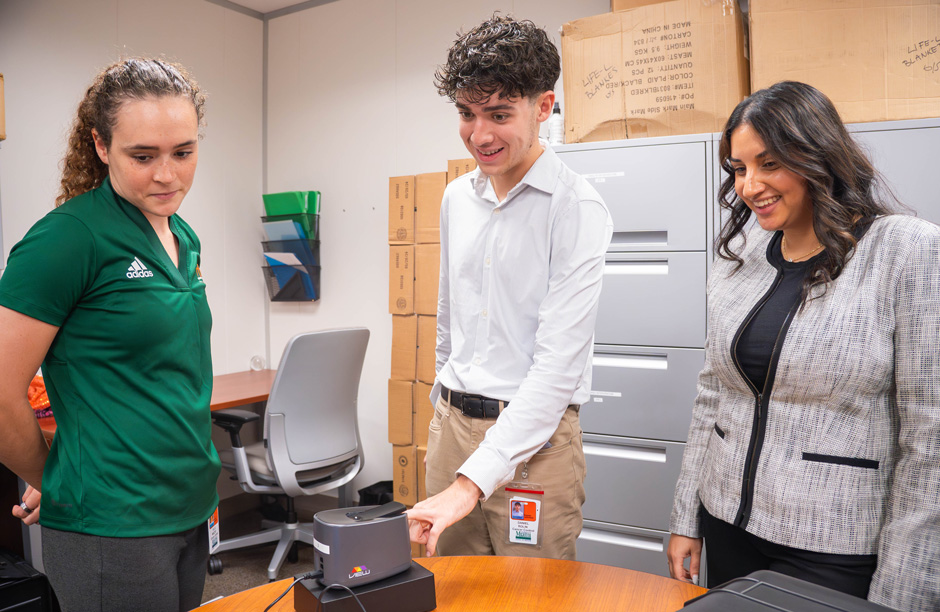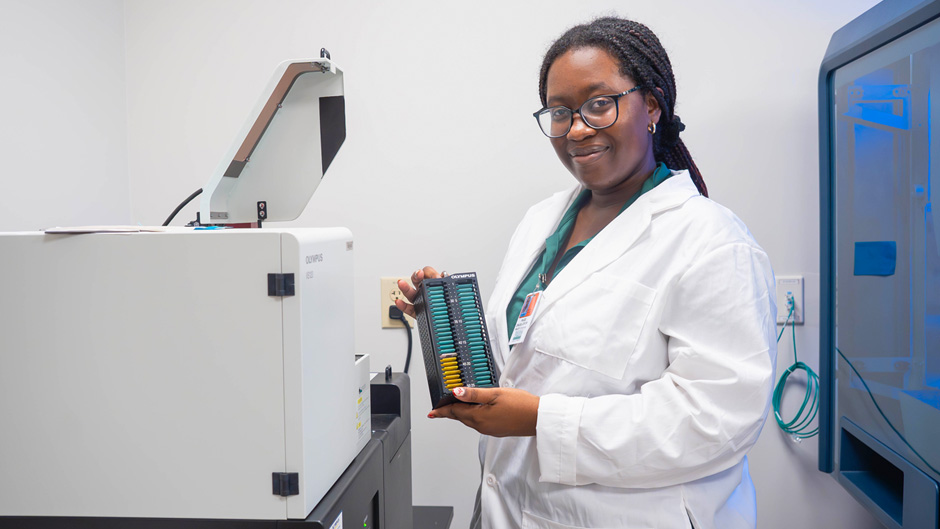When Daniel Rolin took a kinesiology course in fall 2023, he realized that there are more benefits to his daily workouts than simply looking fit and feeling great.
He could also be fending off cancer, if he paired his exercise with eating right.
“We spoke about foods that inhibit certain enzymes and reduce the chances of cancer metastasizing,” he said. “Foods that include fiber, like nuts, seeds, and legumes, along with leafy greens, beets, and carrots.”
The experience piqued Rolin’s interest in cancer research and motivated him to apply for a new pilot program that pairs undergraduates with top researchers at Sylvester Comprehensive Cancer Center at the University of Miami Miller School of Medicine. The program, called Sylvester Program for Academic Research and Knowledge, or SPARK, which launched in the Fall 2024 semester, allows undergraduate students to be immersed in cancer research and earn course credit for their work.
Rolin, a sophomore studying health science at the School of Nursing and Health Studies, is one of just five undergraduate students working in labs at Sylvester with researchers in cancer control, tumor biology, and translational oncology. Rolin is working in associate professor Tracy Crane’s lab, alongside a large team of scientists exploring the most effective ways to tailor diet and exercise interventions for cancer survivors. Crane’s 50-member lab team employs evidence-based strategies to support cancer survivors in adopting healthier lifestyle choices and improving their quality of life.
“Cancer is one of the leading causes of death in the U.S., but if we spread more awareness about the steps we can take to prevent breast and colorectal cancer, that’s ideal,” said Rolin, who is currently a premed student.
Crane is now running several clinical trials to help cancer survivors, and Rolin’s help has been critical, she said. He spends more than 10 hours a week working with postdoctoral fellow Harleen Kaur to identify and recruit participants for the Precision Oncology Interventions in Nutrition and Training, or OnPOINT, intervention study. Rolin is also creating educational materials for survivors to track their diet and exercise.

“These are all heavy personnel trials, so Daniel is one of the many people helping us run OnPOINT and make it a success,” said Crane, an associate professor of medical oncology and Sylvester’s director of lifestyle medicine, prevention, and digital health. She added: “The SPARK program is a great way to identify students who are interested in cancer and who want to be involved.”
The SPARK program requires students to spend at least 8 hours a week in a lab at the Medical Campus to earn two credits. If students continue beyond two semesters, they may also be able to earn a stipend, said Vanina Zack, program coordinator in the Office of Undergraduate Research.
The new program grew out of a collaboration between leaders at Sylvester and the Office of Undergraduate Research. Leaders hope the program will grow and entice undergraduates to careers in cancer research, and ideally it will also expand the number of premed students interested in oncology.
“Programs like SPARK are essential for inspiring the next generation of medical researchers and fostering a passion for discovery in young minds,” said Dr. Stephen D. Nimer, director of Sylvester Comprehensive Cancer Center, and Oscar De la Renta Endowed Chair in Cancer Research at the Miller School of Medicine. “By engaging undergraduate students early in their academic journey, we have the opportunity to direct their energies and talent to help them appreciate the breadth and impact of cancer research.”
Michael Gaines, director of undergraduate research and community outreach, agreed.
“SPARK provides undergraduates with a fast-track into cancer research with eminent mentors at the Sylvester Comprehensive Cancer Center who are internationally recognized for their research,” Gaines said.
Paige Owusu-Ofori, a sophomore also studying health science, is working in research assistant professor Anis Ahmad’s lab to investigate the benefits and drawbacks of radiation treatment for cancer patients. The lab focuses on using kidney tissue to identify these impacts, and she is learning complex biomedical techniques to analyze samples.
Owusu-Ofori has always been interested in becoming a doctor, but after shadowing oncologists in high school, she decided she would like to care for cancer patients. She feels lucky to be part of the first cohort of undergraduates in SPARK.
“This experience has been eye opening for me to see another side of medicine,” said Owusu-Ofori, who plans to continue working in the lab for at least two years. “I am now able to look beyond medical care at new treatments and techniques from a scientific point of view, and I feel very fortunate to get this training—I’ve learned way more than in any other lab course I’ve taken.”
To learn more about SPARK and apply for the program, contact Vanina Zack at vzack@miami.edu.

